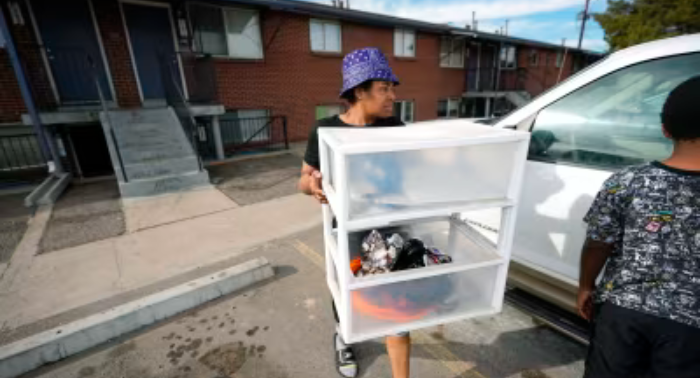Caitlyn Colbert, a single mother in Denver, has experienced firsthand the staggering rise in rent prices over the past decade. What started as a manageable $750 for her two-bedroom apartment has ballooned to an astronomical $3,374 per month as of last year. Like many Americans, Colbert has been forced to make difficult choices each month, weighing essentials like rent against expenses for her three children, such as school supplies or groceries.
“It’s a constant struggle to make ends meet,” Colbert laments, describing a routine of budgeting and scrimping just to scrape by. Often, she finds herself facing eviction notices, with a mere 30 days to cough up the increasingly exorbitant rent or risk losing her home.
Colbert’s story is not unique. Across the United States, millions of individuals, particularly people of color, are grappling with the harsh reality of unaffordable rent hikes. This crisis has been fueled by a combination of factors, including inflation, a severe shortage of affordable housing, and the cessation of pandemic relief measures.
Recent data from the Harvard Joint Center for Housing Studies paints a dire picture: a record-breaking 22.4 million renter households, constituting half of all renters nationwide, are spending over 30% of their income on rent. Moreover, the number of affordable housing units, with rents below $600, has dwindled to 7.2 million, marking a stark decline of 2.1 million units compared to a decade earlier.
The repercussions of this housing affordability crisis are profound. Eviction filings have surged, and homelessness has reached unprecedented levels. Whitney Airgood-Obrycki, a senior research associate at the Harvard center, compares the current situation to the aftermath of the Great Recession in 2008, when millions of Americans lost their homes to foreclosure.
In response to the worsening crisis, both state and federal lawmakers are taking action in 2024. Proposals abound, ranging from eviction protections and zoning reforms to capping annual rent increases and allocating billions of dollars towards the construction of new housing units. The urgency of these measures cannot be overstated, particularly for vulnerable populations.
Take, for instance, the plight of residents at the American Mobile Home Park in Auburn, Massachusetts. Facing rent hikes of up to 40%, many tenants, predominantly seniors and individuals on fixed incomes, are grappling with the prospect of homelessness. Amy Case, a 49-year-old administrative assistant, is at a loss, contemplating how to reconcile a $345 monthly rent increase with her already stretched budget, which includes medical expenses for a brain tumor.
Similar stories of financial strain and housing insecurity abound, underscoring the urgent need for robust legislative intervention. In Colorado, for instance, evictions are on the rise, with over 50,000 filings recorded last year alone. Monique Gant, a mother of two, is one such casualty, forced to navigate the harsh reality of eviction and homelessness while striving to shield her children from the emotional toll.
The impact of housing instability on children is particularly concerning. Studies have shown that housing turbulence and eviction can have far-reaching consequences on children’s mental health and development. Nick Graetz, co-author of a study on eviction trends, emphasizes the urgent need for comprehensive solutions to mitigate these harms.
In response, lawmakers at both the federal and state levels are pushing for a range of measures to address the housing affordability crisis. From expanding federal tax credits for affordable housing to implementing rent control policies and increasing funding for rental assistance programs, policymakers are exploring various avenues to alleviate the burden on struggling families.
However, the road ahead is fraught with challenges, and the scale of the crisis demands bold, concerted action. As Colorado Governor Jared Polis aptly notes, failure to act now risks pushing us past a point of no return. The time to prioritize housing affordability is now, lest we consign millions of Americans to the perpetual cycle of housing insecurity and financial distress.




